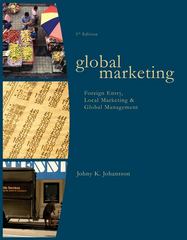Question
Export processing zones (free trade zones) are an important part of contemporary global capitalism. The products account for around half a trillion dollars in manufactured
Export processing zones (free trade zones) are an important part of contemporary global capitalism. The products account for around half a trillion dollars in manufactured goods and employ roughly 75 million people. One of the reasons these zones are popular is that they are easy to leave. TNCs do not own the capital infrastructure and they have no legal entanglements outside the free trade agreement they entered into. When workers attempt to organize for better wages and working conditions, the TNCs tend to leave (see, for example, this story on an EPZ in Sri Lanka). This would seem to be dysfunctional to states. States, after all, create these zones in order to attract capital that can lead to more citizens having jobs, thereby growing the economy overall. I'd like you all to discuss: 1. Why states do not do more to try and prevent TNCs from leaving.
2.What things particular states or international organizations may have tried (you'll need to kick around online to find this stuff).
3.Why states do not simply allow workers to continue producing products regardless of whether the TNC is there or not.
Step by Step Solution
There are 3 Steps involved in it
Step: 1

Get Instant Access to Expert-Tailored Solutions
See step-by-step solutions with expert insights and AI powered tools for academic success
Step: 2

Step: 3

Ace Your Homework with AI
Get the answers you need in no time with our AI-driven, step-by-step assistance
Get Started


